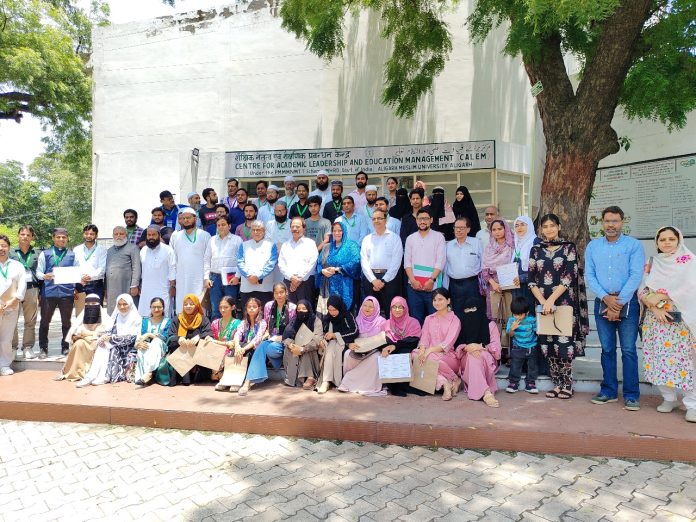– Mohd.Naushad Khan
Aligarh: A pioneering two-week Capacity Building Programme aimed at transforming grassroots education concluded at Aligarh Muslim University (AMU) on July 15. Organised jointly by the Alliance for Economic and Educational Development of the Underprivileged (AEEDU) and the UGC Malaviya Mission Teacher Training Centre (MMTTC) at AMU, the initiative brought together 50 educators from schools and madrasas serving underprivileged communities.
Titled “Teaching with Impact: Communication, Innovation, and Integration of AI in Education,” the programme was held from July 1 to 15 and focused on equipping teachers with cutting-edge pedagogical skills, AI integration tools, and impactful communication techniques to enhance classroom experiences.
Held in an intensive face-to-face format, the programme featured three sessions daily, conducted by AMU’s experienced faculty. Key sessions included Prof. Parvaiz Talib on effective communication, Dr. Rahila Rais on psychological counselling for students, Mr. Malik Mohd Arshad on digital tools like Google Classroom, and Dr. Mohammad Nadeem and Dr. Asif Irshad Khan on practical applications of Artificial Intelligence in education.
Participants also engaged in hands-on training sessions, lab work, and experiential learning through visits to AMU’s iconic library and campus facilities. To ensure smooth participation, organisers provided travel allowances, meals, and accommodation, especially for those coming from outside Aligarh.
The inaugural session was graced by Prof. A.R. Kidwai, while the valedictory ceremony featured IRS (Retd.) officer and CEO of AEEDU, Mr. Syed Mahmood Akhter, who underscored the importance of empowering educators to uplift the standards of education at the grassroots level.
At the closing ceremony, participants were awarded joint certifications from UGC MMTTC, AMU, AEEDU, and Project Rise, highlighting the collaborative effort towards inclusive and innovative teacher development.
This initiative marks a significant step in strengthening education for underserved communities by merging traditional values with modern, tech-enabled teaching methods.




